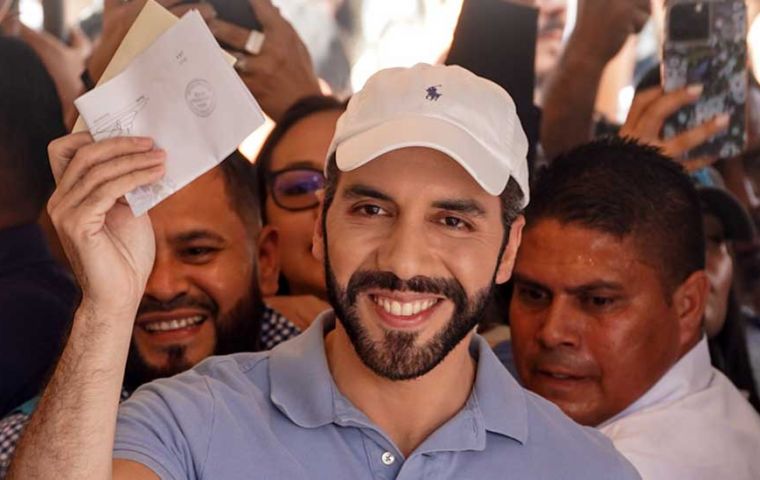MercoPress. South Atlantic News Agency
Bukele announces victory in El Salvador elections
 Argentina's violence problem is not as big as El Salvador's, Bukele said
Argentina's violence problem is not as big as El Salvador's, Bukele said El Salvador's Nayib Bukele declared himself the winner “with more than 85% of the votes” before the official results of Sunday's elections were released. “According to our numbers, we have won the presidential election with more than 85% of the votes and a minimum of 58 of 60 Assembly deputies,” he stressed on social media.
Bukele, 42, was the first head of state to run for re-election since the end of the civil war in 1992 despite an express Constitutional ban on consecutive terms. Nevertheless, Bukele underlined his achievement set a “record in the entire democratic history of the world.”
With Sunday's results, the incumbent leader clung to the Parliamentarian majority he won two years ago, and through which he declared on March 27, 2022, the emergency regime under which he undertook his fight against gang violence, leading to the arrest of some 76,000 people.
Bukele was the favorite to win given the scarce public the other four candidates had, including Manuel Flores of the Farabundo Martí National Liberation Front (FMLN, left), and Joel Sánchez, of the Nationalist Republican Alliance (Arena, right), the two parties that shared power before Bukele's Nuevas Ideas (NI) came onto the scene.
If confirmed, Bukele will be the first president reelected in the last 32 years, thanks to a peculiar construction of the Constitution by the Supreme Court's Constitutional Bench appointed in an unclear manner by a pro-government Congress.
According to press reports, citizens who were still in line when polling stations closed were kept from casting their votes. In addition, Joel Sánchez denounced that Bukele's followers continued to make propaganda inside voting centers.
Asked about Argentina, Bukele said Sunday that the South American country does not need as drastic security measures as El Salvador to tackle its security problems. He also said El Salvador was willing to help in this regard if Argentine authorities so decided.
“We have officially offered [Security] Minister [Patricia] Bullrich, not advice, but the collaboration they need in all security matters,” Bukele told reporters minutes after the closing of the polling stations. Since “the problem is smaller, maybe the medicine can be smaller as well,” Bukele explained.
Under Bukele's state of emergency, the Police may detain any person without an arrest warrant and keep them in detention for at least 15 days before bringing them before a court. The measure has been extended 22 times by Congress for 30-day periods. It also curtails the right to defense of detainees and the inviolability of telecommunications. Humanitarian organizations have received more than 6,000 reports of abuses, arbitrary arrests, warrantless searches, deaths in prisons, and torture.
In 2015, El Salvador was the most violent country in the world with 103 homicides per 100,000 inhabitants.




Top Comments
Disclaimer & comment rules-

Read all commentsExcellent...
Feb 06th, 2024 - 01:32 pm 0Commenting for this story is now closed.
If you have a Facebook account, become a fan and comment on our Facebook Page!